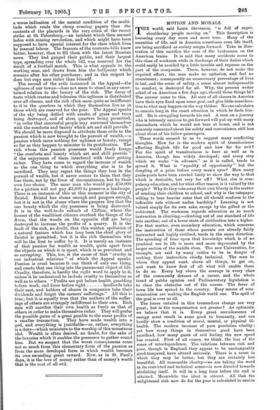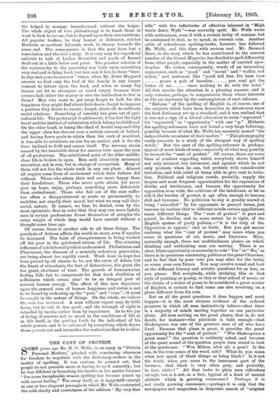T HE world, said Louis Stevenson, "is full of eager, shouldering
people moving on." This description is becoming every day more and more true. Many of the amenities of life, and in America sometimes even life itself, are being sacrificed as society surges forward. Take in illus- tration of this sacrifice the case of the brakesmen on the American trains. It is said that many accidents occur to this class of workmen while in discharge of their duties which could easily be avoided by a little trouble and expense on the part of the companies. These, however, do not make the required effort; the men make no agitation, and feel no resentment; consequently an unnecessary percentage of lives is lost, and the sense of safety, a sense almost indispensable to comfort, is destroyed for all. Why, the present writer asked of an American a few days ago, should these things be P The answer came to this. All men of all classes in America have their eyes fixed upon some goal, and give little considera- tion to what may happen on the way thither. No one calculates to remain long in the exact situation in which he finds him- self. He is struggling towards his end. A man on a journey who is intensely anxious to get forward will put up.with many discomforts which he would not bear at home, and is not minutely concerned about his safety and convenience, still less about those of his fellow-passengers.
These words seemed to us to suggest many conflicting thoughts. How far is the modern spirit of transitoriness affecting English life for good and how far for evil P For the spirit of transitoriness is here as well as in America, though less widely developed; and every step which we make "in advance," as it is called, tends to spread it. What is "equality of opportunity" but the dangling of a prize before every man's eyes ? How many guide-posts have been erected lately to show the way to that which is desirable, but very far off ? What else is com- pulsory education, and for what other reason is it valued by the people ? Why do they vote away their own liberty in the matter of sending their children to school, and why is the ratepayer willing to bear heavier rates that all should conform to the inflexible rule without undue hardship P Learning is not valued simply for its own sake, except by the gifted or the cultivated. The workman regards education as so much instruction in climbing,—climbing out of one standard of life into another, out of a lower state of civilisation into a higher. For that matter, even secondary education, which concerns. the instruction of those whose parents are already fairly instructed and highly civilised, tends in the same direction. The spending of time upon that knowledge which is of no practical use in life is more and more deprecated by the larger section of the middle class. The new Universities, for example, are said by many critics to be in danger of making their instruction chiefly technical. The men to whom they appeal want, above all things, to get on, and want to know first of all what will enable them to do so. Every boy above the average in every class of the community dreams of a career, and the whole trend of public opinion and Parliamentary legislation is to clear the obstacles out of the course. The fever of town life has spread to the country. Easy means of com- munication are making the English world one. The spell of the goal is over us all.
The losses entailed in this tremendous change are very great ; but is the compensation not greater ? As optimists, we believe that it is. Every great recrudescence of energy must result in some good to humanity, and can hardly show a condition of moral, mental, or physical ill- health. The modern increase of pace proclaims vitality ; yet how many things in themselves good have been sacrificed, how many gusts of evil feeling the new speed has created. First of all comes, we think, the loss of the sense of interdependence. The relations between rich and poor, though in England they appear to be unchangeably good-tempered, have altered seriously. There is a sense in which they may be better, but they are certainly less• beautiful. All reasonable charity—we are taking the word in its restricted and technical sense—is now directed towards abolishing itself. It will be a long time before the end is attained. Meanwhile the ideal is altered. All that the enlightened rich now do for the poor is calculated to enable
the helped to manage henceforward without the helper. The whole object of wise philanthropy is to teach those in want to look to no one. but to depend upon their own exertions.
All popular leaders, be they honest or dishonest, red-hot Radicals or cautious Liberals, work, in theory, towards the same end. The consequence is that the poor have lost a consolation and the rich a duty. It is very easy for superficial satirists to talk of Ladies Bountiful and yards of flannel dealt out at a little below cost price. The peculiar relation of the squirearchy to the peasantry was built upon something very real and is dying hard, but how can it live in these "here- to-day-and-gone-to-morrow " times, when Mr. Rider Haggard assures us that only the fool of the family is any longer content to labour upon the land, and when so many big houses are let to strangers or stand empty because their owners lack either the money or else the inclination to live in them ? Men who want to get away forget to look for the happiness they might find about their doors; forget to improve a position they desire to vacate ; forget, above all, to cultivate social relations. Something of amenity has gone out of agri- cultural life. The proletariat is adolescent; it has lost the light heart and the instinct of submission which belong to childhood. On the other hand, in losing the ideal of feudal responsibility the upper class has thrown over a certain amount of ballast, and having fewer goals to attain than the ruck of mankind, is less able to substitute an aim for an anchor, and is for the time inclined to drift and amuse itself. The nervous strain caused by the insatiable thirst for success tells upon the men of all professions. The established quiet of the older middle- class life is broken in upon. Men seek absolutely necessary recreation, not in rest, but in change of occupation Many of them will not live the whole week in any one place. Almost all require some form of excitement which their fathers did without. Those who attain their end are more happy than their forefathers. Those who never quite attain, yet never give up hope, enjoy, perhaps, something more delectable than contentment. Those who fall out of the race suffer too often a disappointment so acute as permanently to embitter, not exactly their moral, but what we may call their social, nature. It cannot, we fear, be denied, even by the most optimistic, that in order that they may run more lightly men in certain professions divest themselves of scruples the extra weight of which they would have carried without a thought some time ago.
Of course, there is another side to all these things. The paralysis of dulness afflicts the world no more, even if squalor be increased. The taint of obsequiousness is being washed off the .poor in the quickened stream of life. The stunting influence of a hidebound pride is undermined. Philistinism and Pharisaism, the diseases of a mentally sedentary generation, are being almost too rapidly cured. Work done in hope has been proved by all classes to be, not the curse of Adam, but the finest of stimulants, the best of distractions, the great, the too great, shortener of time. The growth of humanitarian feeling bids fair to compensate for that fresh ebullition of selfishness which seems, alas ! to be an integral part of natural human energy. The effect of this new departure upon the general sum of human happiness and virtue is not to be found by reckoning up the " pros " and " cons." ; it must be sought in the nature of things. On the whole, we believe the sum has increased. A man without vigour may do little harm, but he will do less good ; and the triumph of right is retarded by inertia rather than by impatience. As to the joy of living, it consists not so much in the conditions of life as in life itself, in the putting forth by the individual of his whole powers, and it is enhanced by everything which draws those powers out and intensifies his realisation that he is alive.







































 Previous page
Previous page